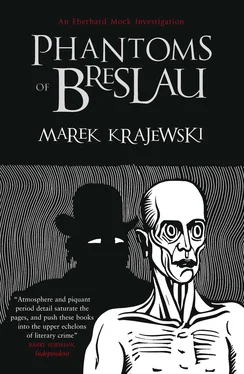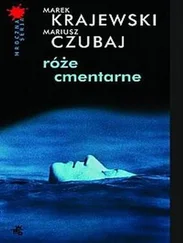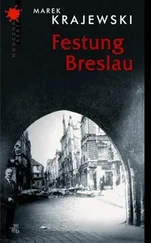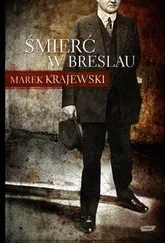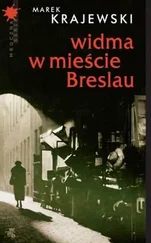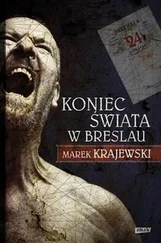Marek Krajewski - Phantoms of Breslau
Здесь есть возможность читать онлайн «Marek Krajewski - Phantoms of Breslau» весь текст электронной книги совершенно бесплатно (целиком полную версию без сокращений). В некоторых случаях можно слушать аудио, скачать через торрент в формате fb2 и присутствует краткое содержание. Жанр: Полицейский детектив, на английском языке. Описание произведения, (предисловие) а так же отзывы посетителей доступны на портале библиотеки ЛибКат.
- Название:Phantoms of Breslau
- Автор:
- Жанр:
- Год:неизвестен
- ISBN:нет данных
- Рейтинг книги:3 / 5. Голосов: 1
-
Избранное:Добавить в избранное
- Отзывы:
-
Ваша оценка:
- 60
- 1
- 2
- 3
- 4
- 5
Phantoms of Breslau: краткое содержание, описание и аннотация
Предлагаем к чтению аннотацию, описание, краткое содержание или предисловие (зависит от того, что написал сам автор книги «Phantoms of Breslau»). Если вы не нашли необходимую информацию о книге — напишите в комментариях, мы постараемся отыскать её.
Phantoms of Breslau — читать онлайн бесплатно полную книгу (весь текст) целиком
Ниже представлен текст книги, разбитый по страницам. Система сохранения места последней прочитанной страницы, позволяет с удобством читать онлайн бесплатно книгу «Phantoms of Breslau», без необходимости каждый раз заново искать на чём Вы остановились. Поставьте закладку, и сможете в любой момент перейти на страницу, на которой закончили чтение.
Интервал:
Закладка:
When they had all left, a feeling of irritation swept over me. The Master had not let me take the voice! I had not managed to say that the Erinyes do not have to be particles of a parent’s soul alone. In Sophocles’ Women of Trachis , the Erinyes are invoked against Deianira, who unwittingly killed her lover Heracles! And in the same author’s Electra , the Erinyes are called upon to avenge matrimonial infidelity! I have made a decision: I am going to kill the one who loves our greatest enemy, and I will make it known to her before she dies that she is dying through his fault and because of him! I will be releasing not only his father’s Erinyes, but also the Erinyes of the woman who is in love with him! In this way I will put an end to everything. I will bring down upon him a twofold attack of the Erinyes. Then they will sing out their dismal hymn inside his head, a song which, like the songs of the Tyrolean snow maidens, will drive him insane. And only then will he turn to an occultist for help. And only then will he get to know the truth and become aware of his mistake!
BRESLAU, THAT SAME SEPTEMBER 26TH, 1919
A QUARTER PAST TWELVE IN THE AFTERNOON
Kurt Smolorz sat at the marble table in the waiting room of his neigh-bour, the solicitor Doctor Max Grotzschl, lazily leafing through the Ostdeutsche Sport Zeitung . The articles did not particularly interest him. Only one thing interested Smolorz: how the instructions Mock was going to give him that day would complicate his evening rendez-vous with Baroness von Bockenheim und Bielau. He was soon to find out: the telephone on the marble table jumped and rang loudly. Smolorz lifted the round receiver from its cradle and held it to his ear. With his other hand he grasped the mouthpiece and brought it to his lips. He tilted back his chair with an expression of a man of the world.
“May I speak to Doctor Grotzschl?” said a woman’s quiet voice. He did not know how to react. Usually at moments like this, when he was at a loss as to know what to do, he scaled down his reactions and did nothing. So it was now. He simply looked at the receiver and replaced it on the cradle. The telephone rang again. This time Smolorz was not in such a predicament as a few seconds earlier.
“Go on, Smolorz.” He heard Mock’s hoarse bass. “Tell me what’s happened to my father!”
“There were noises in the house last night,” Smolorz mumbled. “He went to check and fell down the stairs. Fractured his leg and injured his head. The dog barked and woke the neighbours. A certain Mr Dosche took him to St Elisabeth Hospital. He’s in good care. Unconscious. On a drip.”
“Call Doctor Cornelius Ruhtgard immediately on seventeen sixty-three. If he’s not at home, call the Wenzel-Hancke Hospital. Tell him I want him to take care of my father.” Mock fell silent. Smolorz did not say anything either and, staring at the tube into which he had just spoken, wondered at the fundamental nature of telephone communications. “How’s our investigation going?” Smolorz heard Mock say.
“Twenty young female invalids in wheelchairs in the whole of Breslau. We visited them with Frenzel …”
“Frenzel has turned up?” Smolorz could hear the hoarse bass voice tremble with joy at the other end of the receiver.
“Yes. He’s a gambler. He was betting at Orlich’s. Arm-wrestling. He lost, and two days later went home broke.”
“And what? You showed Frenzel those women? Discreetly, I hope?”
“Yes. Discreetly. From a distance. Frenzel in a car, the women in the wheelchairs on the street. He recognized one of them. Louise Rossdeutscher, daughter of the physician Doctor Horst Rossdeutscher. The father is a big fish. Commissioner Muhlhaus knows him.”
“This Rossdeutscher, was he questioned?”
“No. Muhlhaus is prevaricating. Big fish.”
“What’s that supposed to mean, damn it, ‘big fish’?” growled the voice in the receiver. “Explain, Smolorz!”
“Commissioner Muhlhaus said he’s ‘an important person’.” Smolorz could not help being amazed by the fact that here he was, grasping all of Mock’s emotions over the telephone, even though the latter was hundreds of kilometres away from Breslau. “‘We have to proceed carefully. I know him.’ That’s what he said.”
“Is Rossdeutscher being watched?”
“Yes. All the time.”
“Good, Smolorz.” The crack of a match resounded in the receiver. “Now listen. I’m arriving in Breslau tomorrow, at 7.14 in the evening. At that very hour you’re to be waiting for me at Main Station. Wirth, Zupitza and ten of their men are to be with you. You’re going to show the girl I’m with — you know, it’s that red-headed Erika — a photograph of Louise Rossdeutscher … If you don’t have a photograph of her, get in touch with Helmut Ehlers and pass my request on to him: he’s to take a photograph of Louise Rossdeutscher’s face by tomorrow. Remember — tomorrow, 7.14 at the station. And don’t plan anything else … For the whole evening and night you’re to be at my disposition. By tomorrow you’re to have gathered every scrap of information you can about this doctor. I know it might be difficult, officially we’ve been removed from the investigation and Muhlhaus is treating the suspect like a rotten egg, but do whatever is in your power. Any questions?”
“Yes. Is Rossdeutscher suspected of all these murders?”
“Think, Smolorz.” Cigarette smoke expelled from Mock’s lungs hit the telephone membrane. “The four sailors were stuffed with morphine before they died. Who has access to a lot of morphine? A physician. I don’t know whether Rossdeutscher is a suspect, but I do know that he and his daughter were probably the last people to see those dressed-up men. I want Rossdeutscher with his back up against the wall.”
“One more question. Why Wirth and Zupitza?”
“How would you describe Muhlhaus’ behaviour as regards Ross deutscher?” This time Smolorz heard the voice of a kind-hearted teacher examining a dull-witted pupil. “He’s afraid to interrogate him, he speaks of him as ‘an important person’ and so on … How would you describe such behaviour?”
“I’d say he’s fluffing about.”
“Good, Smolorz.” Mock had stopped sounding kind-hearted. “Muhlhaus is fluffing about. We’re not going to fluff about. That’s why I want Wirth and Zupitza.”
BRESLAU, SATURDAY, SEPTEMBER 27TH, 1919
7.14 IN THE EVENING
The train from Stettin pulled into Breslau’s Main Station. Erika Kiesewalter held her head out of the window. Through tears forced from her eyes by the rush of air she watched the fleeing platforms, the flower kiosks, the mighty iron columns holding up the glass vault, and the tobacco and newspaper kiosks. White columns of steam blew onto the platforms and enveloped the people waiting there in a warm cloud. On the whole they stood alone, most of them elegantly attired gentlemen wearing velvet gloves and holding bunches of flowers wrapped in coarse parchment. There would also generally be a few dignified ladies amongst them who, at the sight of much-missed and long-awaited faces at the carriage windows, would suddenly open their parasols or tear their hands away from their lips to send kisses into the distance. There was no shortage of similar types on the platform now. But the group of thirteen glum-looking men, most with peaked or soft caps pulled down to their ears, formed a clear contrast. The sleeper carriage stopped practically in front of them. The men looked like bandits and Erika watched them anxiously, but she was soon reassured by the sight of the familiar face framed by wiry red hair that belonged to Mock’s subordinate. Mock himself, entrusting their suitcases to a porter, stepped off the train and — much to his colleague’s surprise — slipped his hands beneath Erika’s arms, spun her like a child and stood her on the platform. He shook the hands of the red-headed man and of two other men who, though diametrically opposite in height, had one characteristic in common: both were repulsive.
Читать дальшеИнтервал:
Закладка:
Похожие книги на «Phantoms of Breslau»
Представляем Вашему вниманию похожие книги на «Phantoms of Breslau» списком для выбора. Мы отобрали схожую по названию и смыслу литературу в надежде предоставить читателям больше вариантов отыскать новые, интересные, ещё непрочитанные произведения.
Обсуждение, отзывы о книге «Phantoms of Breslau» и просто собственные мнения читателей. Оставьте ваши комментарии, напишите, что Вы думаете о произведении, его смысле или главных героях. Укажите что конкретно понравилось, а что нет, и почему Вы так считаете.
